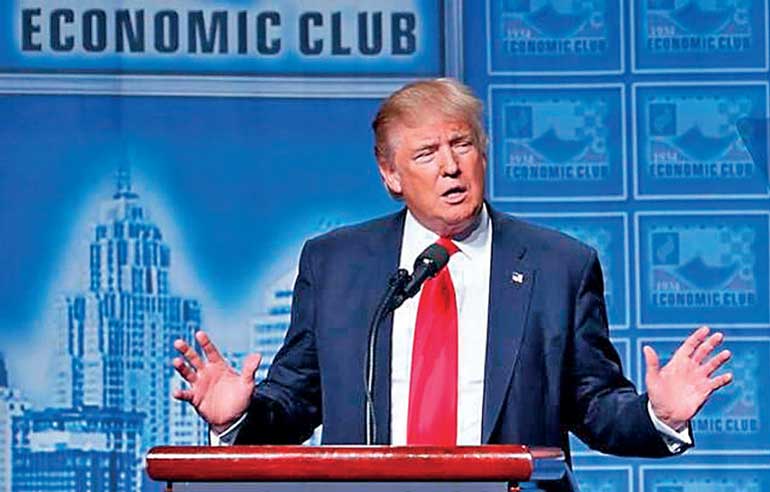Saturday Feb 21, 2026
Saturday Feb 21, 2026
Wednesday, 10 August 2016 00:00 - - {{hitsCtrl.values.hits}}
 Republican US presidential nominee Donald Trump speaks to the Detroit Economic Club at the Cobo Centre in Detroit, Michigan 8 August
Republican US presidential nominee Donald Trump speaks to the Detroit Economic Club at the Cobo Centre in Detroit, Michigan 8 August
Washington (Reuters): Fifty prominent Republican national security officials, including a former CIA director, on Monday called party nominee Donald Trump unqualified to lead the country and said he would be “the most reckless president in American history.”
The statement was the latest repudiation of Trump’s candidacy by veteran Republican national security specialists, and was remarkable for the harshness of its language.
“Mr. Trump lacks the character, values, and experience to be president. He weakens U.S. moral authority as the leader of the free world. He appears to lack basic knowledge about and belief in the U.S. Constitution, U.S. laws and U.S. institutions, including religious tolerance, freedom of the press, and an independent judiciary,” the statement said.
“None of us will vote for Donald Trump,” said the statement, which noted that some signatories also have doubts about Democratic presidential nominee Hillary Clinton.
“From a foreign policy perspective, Donald Trump is not qualified to be president and commander in chief,” said the statement, which was first reported in the New York Times. “Indeed, we are convinced that he would be a dangerous president and would put at risk our country’s national security and well-being.”
The signatories, some of whom worked for more than one Republican president, included former Central Intelligence Agency Director Michael Hayden, who also headed the National Security Agency; former Homeland Security Secretary Michael Chertoff; former Director of National Intelligence John Negroponte; and two former U.S. trade representatives, Carla Hills and Robert Zoelick.
Other signatories included former senior State Department, Pentagon and National Security Council officials who helped plan and oversee the 2003 U.S. invasion of Iraq. Trump has harshly criticized the Iraq operation, although when radio host Howard Stern asked him in 2002 if he favored invading Iraq, Trump said he guessed he did.
The statement was organised by Philip Zelikow, who served as a top adviser to former Secretary of State Condoleezza Rice.
Trump responded with a statement deriding the signatories as members of “the failed Washington elite” who “deserve the blame for making the world such a dangerous place.”
“These insiders – along with Hillary Clinton – are the owners of the disastrous decisions to invade Iraq, allow Americans to die in Benghazi, and they are the ones who allowed the rise of ISIS,” he continued, using an acronym for the Islamic State militant group.
Response to Trump’s remarks
The statement did not cite specific comments by Trump, but it clearly was a response to a series of remarks he has made questioning the need for NATO, expressing admiration for Russian President Vladimir Putin, calling for a temporary ban on immigration by Muslims, and inviting Russia to hack Clinton’s private email server - which he later said was a joke.
Many of the signatories had declined to sign an open letter disputing Trump’s national security qualifications that was published in March.
The statement said many Americans are frustrated with the federal government’s failure to solve domestic and international problems.
“But Donald Trump is not the answer to America’s daunting challenges and to this crucial election,” the statement said. “We are convinced that in the Oval Office, he would be the most reckless President in American history.
Some Democratic foreign policy experts called the statement a reminder of the divisions the New York real estate developer’s nomination has sown within the Republican Party.
“This letter is signed by those who remain in the internationalist wing of the party – many were former advisors to candidates who lost the primary fight to Trump,” said Brian Katulis, a fellow at the Center for American Progress and a Clinton campaign adviser.
“Calling Trump unqualified to be commander in chief is tough, but also asserting that he’s lacking in character and understanding of our basic values is really pretty amazing,” said Tommy Vietor, a former National Security Council spokesman in Democratic President Barack Obama’s administration. “That said, I think it’s unlikely to influence many voters, but it could give cover to Republican members of Congress and donors who want to cut the cord and move on from Trump.”